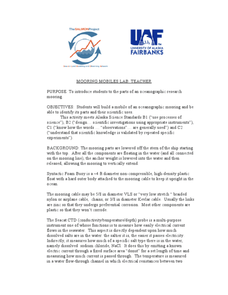NOAA
Chemosynthesis and Hydrothermal Vent Life
What's life like in a hydrothermal vent? Find out in part five of a 13-part series. Learners journey to one of the harshest environments on the planet, the hydrothermal vent, to learn about the creatures that survive the extreme...
NOAA
Deep-Sea Benthos
Much like a distant planet, the underwater world of deep-sea benthos is strange and largely unknown. How do creatures survive and thrive in such extreme pressure and temperature conditions? Young oceanographers join the crew of Operation...
NOAA
Journey to the Unknown
What's it like to be a deep-sea explorer? Tap into the imaginations of your fifth and sixth graders with a vivid lesson, the second part of a six-part adventure. Learners close their eyes and submerge themselves in an expedition aboard...
NOAA
Build Your Own Ocean Ecosystem
Hold the sea in the palm of your hand! Amateur oceanographers work together to create models of an ocean ecosystem in the sixth and final installment in a series. Raise awareness of global ocean health issues through guided research,...
NOAA
Animals of the Fire Ice
When the sun's rays can't reach the producers in a food web, where does all the energy come from? Extreme environments call for extreme food sources. Young scientists investigate creatures that appear to get their energy from methane...
NOAA
What Killed the Seeds?
Can a coral cure cancer? Take seventh and eighth grade science sleuths to the underwater drugstore for an investigation into emerging pharmaceutical research. The fifth installment in a series of six has classmates research the wealth of...
NOAA
Oceans of Energy
Are the earth's oceans really just giant batteries, waiting for their energy to be harnessed? Middle school mechanical engineers will be shocked by the amazing amount of energy that forms around them after diving into part four of a...
NOAA
History's Thermometers
How is sea coral like a thermometer? Part three of a six-part series from NOAA describes how oceanographers can use coral growth to estimate water temperature over time. Life science pupils manipulate data to determine the age of corals...
NOAA
Calling All Explorers
Let's get moving! The second installment of a 2-part series of six adventures helps learners take part in individual explorations by sea and by land. After navigating the waters in an informative WebQuest, groups create and hide their...
Project WET Foundation
Discover Our Ocean
A very informative interactive presents ocean zones, estuaries, hot water vents, phytoplankton, coral reefs, sea turtles, kelp forests, and all things that thrive in the ocean.
NOAA
Ocean Exploration
Sea explorers and scientists have found that because of temperatures being two to three degrees Celsius at the bottom of the ocean, most animals are lethargic in order to conserve energy. In this web quest, pairs of learners read about...
NOAA
Technology II
Ping, ping, ping. The last installment of a 23-part NOAA Enrichment in Marine sciences and Oceanography (NEMO) program explores technology use in marine studies, such as sonar. Activity involves simulating sonar techniques to identify a...
NOAA
Ocean Exploration
Where am I? The second installment of a 23-part NOAA Enrichment in Marine sciences and Oceanography (NEMO) program starts with pupils guessing the years in which major ocean exploration events took place. The lesson then focuses on how...
NOAA
Into the Deep
Take young scientists into the depths of the world's ocean with the second lesson of this three-part earth science series. After first drawing pictures representing how they imagine the bottom of the ocean to appear, students investigate...
National Geographic
Ocean Exploration
Dora, Dora, Dora, Dora, Dora! This may be your little ones' best guess as to what it's like to be an explorer! Give them a deeper understanding with this compact examination. A four-minute video introduces them to Robert Ballard, the...
Curated OER
Up for the Challenge?
A general engineering quiz can be given at the beginning of your engineering or technology unit to stimulate interest. A wide variety of topics are touched by engineers, including the medical industry, energy production, building design,...
Curated OER
I, Robot, Can Do That!
Assign groups of middle school oceanographers to research one of the following underwater robots; ABE, Herculues, ROPOS, RCV-150, Tiburon, or general purpose ROVs. An included handout guides them through information to be gathered. Each...
Curated OER
Come On Down!
Begin with an introduction to famous deep-sea submersibles. Learners work in groups to gather information on different vessels and then share with the class. Each group then uses water displacement to help calculate the density of...
Curated OER
Mooring Mobiles Lab
Oceanography experts use candy to construct a model of a bio-physical mooring that would test a variety of factors. Each piece of equipment to be included on the mooring is described within the write-up. As pupils gather the candies for...
Curated OER
My Wet Robot
High schoolers design an underwater vehicle. In this engineering lesson, students will design an underwater robot that includes specific systems for it to function properly. Each group will present their prototype to the class.
Curated OER
Journey to the Unknown
Young scholars explore the ocean depths. In this scenario based lesson, students pretend they are on a submarine in an unknown part of the ocean. By using clues the class discusses and determines where they are in the ocean. They follow...
Curated OER
Exploring Explorations
Learners describe human benefits from ocean exploration. In this ocean exploration instructional activity, students focus on the historical, biological, and physical features of the deep oceans and man's exploration.
Curated OER
What on Earth is That and How Can I Get One?
Students examine how we use submersibles. In this technology based lesson, students examine various technologies used by submersibles in ocean exploration.
Curated OER
Exploring The Oceans
In this science worksheet, students look for the information in order to answer the basic facts concerning common marine life using puzzles.

























